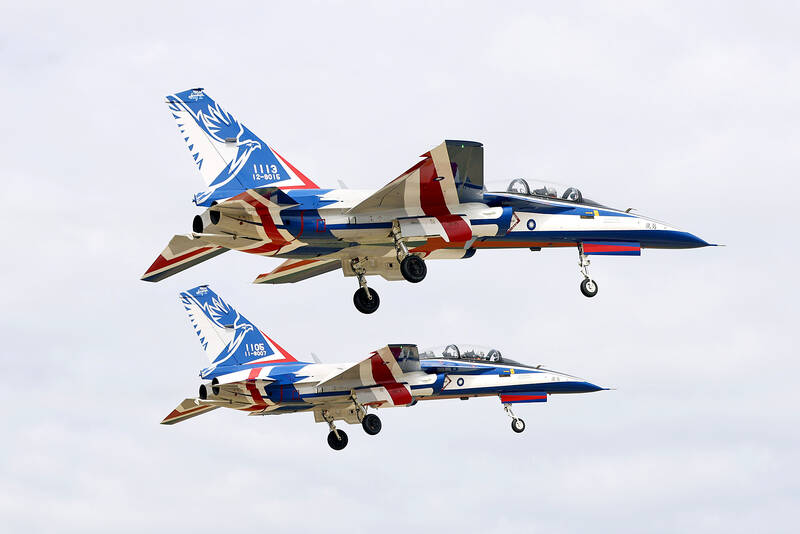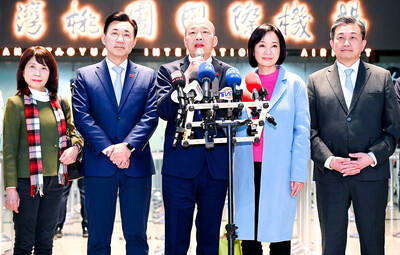The nation’s main domestic aircraft developer yesterday said that it has completed the first stage of design for a military trainer aircraft destined to replace the air force’s Beechcraft T-34C trainers, which are near the end of their service life.
With the completion of the first stage of the design process, the second stage can start once the air force initiates the process to develop and build a new trainer jet, Aerospace Industrial Development Corp (AIDC) said.
A prototype could be built by 2028 and mass production begin in 2031, AIDC said in a statement.

Photo: Ritchie B. Tongo, EPA-EFE
The plan to develop and build 45 domestically made trainers would cost an estimated NT$21.4 billion (US$690.3 million), AIDC said, while obtaining the same number of planes from other nations would cost NT$18.6 billion.
Some savings might be derived from maintenance fees spent on domestically built planes over a lifespan of 25 years, which are estimated at NT$52 billion, less than the about NT$52.9 billion that would be needed for aircraft purchased from abroad, it said.
Investing in domestically produced jets would help boost the economy and create nearly NT$39 billion in spillover effects, AIDC said.
The air force purchased 49 Beechcraft T-34C trainers in 1985, with 40 of them still in service.
Given that the T-34Cs have been in service for nearly 40 years and are not equipped with ejection seats designed to save a pilot’s life in an emergency, several legislators have urged the air force to replace its aging fleet of trainers.
The T-34Cs are to be gradually taken out of service starting in 2033, military and aerospace industry sources said.
About 200 domestic companies have the ability to participate in the development of Taiwan’s first locally designed trainer and more than 70 percent of its components are expected to be made domestically, the sources said.
AIDC said building a new trainer jet domestically would be crucial for the nation’s aerospace sector because it would help bolster its capacity to make high-end aircraft systems and spare parts in preparation for developing next-generation fighter jets.

TRAGEDY: An expert said that the incident was uncommon as the chance of a ground crew member being sucked into an IDF engine was ‘minuscule’ A master sergeant yesterday morning died after she was sucked into an engine during a routine inspection of a fighter jet at an air base in Taichung, the Air Force Command Headquarters said. The officer, surnamed Hu (胡), was conducting final landing checks at Ching Chuan Kang (清泉崗) Air Base when she was pulled into the jet’s engine for unknown reasons, the air force said in a news release. She was transported to a hospital for emergency treatment, but could not be revived, it said. The air force expressed its deepest sympathies over the incident, and vowed to work with authorities as they

A tourist who was struck and injured by a train in a scenic area of New Taipei City’s Pingsi District (平溪) on Monday might be fined for trespassing on the tracks, the Railway Police Bureau said yesterday. The New Taipei City Fire Department said it received a call at 4:37pm on Monday about an incident in Shifen (十分), a tourist destination on the Pingsi Railway Line. After arriving on the scene, paramedics treated a woman in her 30s for a 3cm to 5cm laceration on her head, the department said. She was taken to a hospital in Keelung, it said. Surveillance footage from a

BITTERLY COLD: The inauguration ceremony for US president-elect Donald Trump has been moved indoors due to cold weather, with the new venue lacking capacity A delegation of cross-party lawmakers from Taiwan, led by Legislative Speaker Han Kuo-yu (韓國瑜), for the inauguration of US president-elect Donald Trump, would not be able to attend the ceremony, as it is being moved indoors due to forecasts of intense cold weather in Washington tomorrow. The inauguration ceremony for Trump and US vice president-elect JD Vance is to be held inside the Capitol Rotunda, which has a capacity of about 2,000 people. A person familiar with the issue yesterday said although the outdoor inauguration ceremony has been relocated, Taiwan’s legislative delegation has decided to head off to Washington as scheduled. The delegation

Another wave of cold air would affect Taiwan starting from Friday and could evolve into a continental cold mass, the Central Weather Administration (CWA) said yesterday. Temperatures could drop below 10°C across Taiwan on Monday and Tuesday next week, CWA forecaster Chang Chun-yao (張竣堯) said. Seasonal northeasterly winds could bring rain, he said. Meanwhile, due to the continental cold mass and radiative cooling, it would be cold in northern and northeastern Taiwan today and tomorrow, according to the CWA. From last night to this morning, temperatures could drop below 10°C in northern Taiwan, it said. A thin coat of snow